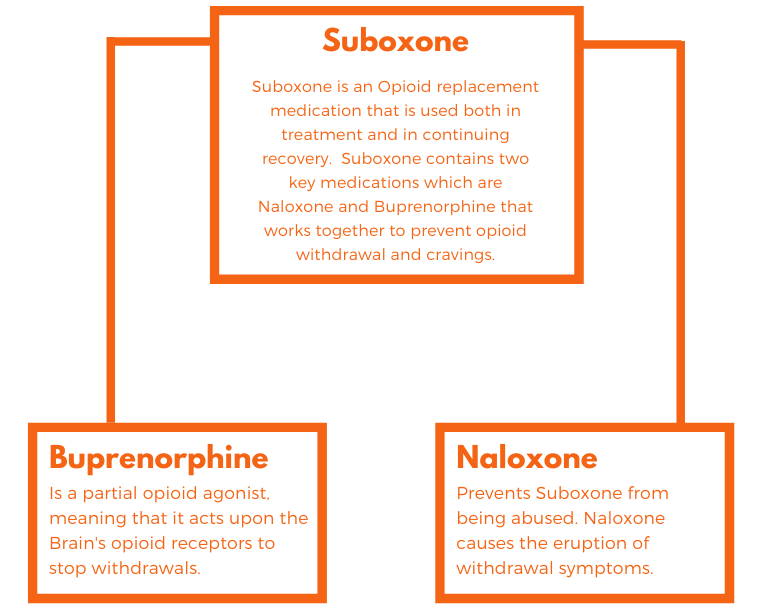Suboxone is a highly regarded medication approved by the FDA to treat opioid use disorder. However, like other prescription medications, the benefits don’t come without potential risks. Whether you or a loved one is taking or abusing this medication, it’s important to be aware of the potential risks and side effects of Suboxone.
What is Suboxone and What Does it Do?
Suboxone is a prescription medication that helps reduce cravings and withdrawal symptoms associated with addiction to opioids like hydrocodone, heroin, codeine, oxycodone, or fentanyl. The medication usually comes in the form of a sublingual film that dissolves under your tongue and is taken once per day. However, some patients may take the medication in tablet form.

Suboxone contains two ingredients: buprenorphine and naloxone. Buprenorphine is an opioid, but it prevents other opioids from being able to bind to receptors in the brain that cause euphoric effects. As a result, people can’t get high while taking Suboxone. Similarly, since buprenorphine is a partial opioid agonist, it helps reduce withdrawal symptoms by making the brain think it is receiving the chemicals it needs to function properly. Unfortunately, as an opioid, people might experience withdrawal symptoms when they stop taking buprenorphine.
Naloxone, on the other hand, is the medication found in the life-saving drug, Narcan, which reverses opioid overdose symptoms. Naloxone is an opioid antagonist, so it reverses the effects of opioids on the nervous system. This prevents people from overdosing on buprenorphine or other opioids while also preventing people from feeling high if they do take opioids. As a result, naloxone’s role is to help reduce a person’s risk of relapse.
Patients typically begin taking Suboxone 12-24 hours after stopping opioids and remain on the medication throughout detox. Depending on the patients’ needs, some might be tapered off of Suboxone after detox while others take it throughout treatment and early recovery. While the medication is highly effective for most people, some experience adverse side effects of Suboxone.
Suboxone Abuse Risk Potential
Suboxone is a Schedule III controlled substance meaning it is recognized for its medicinal value but holds moderate risks for abuse and addiction. For this reason, only certified doctors are able to prescribe this medication in approved addiction treatment settings. Although the drug does carry a moderate risk for abuse, people are far less likely to abuse buprenorphine medications than they are prescription or illicit opioids.
Furthermore, buprenorphine isn’t as strong as most other opioids, so it doesn’t produce the sedative effect that is so well-known among opioid drugs. Not only that, but buprenorphine has what is known as a “ceiling effect.” To explain, although people can build a tolerance to buprenorphine, taking increasing amounts of the drug won’t produce stronger effects. As a result, it is near impossible to get high after building up a tolerance.
People who abuse the drug are more likely to experience adverse side effects of Suboxone. At the same time, some people who abuse the drug don’t even take it in high doses – they simply purchase it on the streets and save the drug for when they experience opioid withdrawal. People who purchase the medication illegally typically aren’t doing so because they want to get sober; they are doing so because they don’t want to feel sick. However, taking any medication against it’s directed purposes is dangerous and can produce severe side effects.
In addition to the risk of Suboxone abuse and addiction, there are some medications and supplements that may interact with the medication, producing adverse side effects. These include:[2]
- Erythromycin
- Benzodiazepines
- Rifampin
- HIV protease inhibitors
People should also refrain from drinking alcohol while taking Suboxone.
Side Effects of Suboxone Use
Like any other medication, there are many side effects associated with Suboxone. Most of these side effects are not long-lasting and tend to subside within a couple of days. However, if you are taking Suboxone and your side effects don’t go away, it’s vital to speak to your physician immediately.[2]
Some side effects of Suboxone use include:
- Numbness, redness, or pain in the mouth
- Headache
- Dizziness
- Tingling or numbness
- Drowsiness
- Insomnia
- Stomach pain
- Vomiting
- Constipation
- Intoxicated feeling
- Difficulty concentrating
In rare cases, there are more severe side effects of Suboxone, such as:
- Irregular heartbeat
- Fainting
- Severe dizziness
- Confusion or irritation
- Hallucinations
- Slow breathing
- Extreme drowsiness
- Inability to wake up
If you’re experiencing any of these severe side effects, or suspect an overdose, it’s imperative that you seek medical help right away.
Since buprenorphine is an opioid, an overdose is one of the more damaging and potentially fatal side effects of Suboxone. Overdose is likely if a person takes too much of the medication or combines it with other drugs. Symptoms of a Suboxone overdose include:
- Blurred vision
- Confusion
- Constricted pupils
- Headaches
- Loss of consciousness and coordination
- Slurred speech
- Nausea/vomiting
- Sweating and chills
- Stomach pain
- Respiratory depression
- Brain damage
- Coma
- Death
In the end, Suboxone is a relatively safe medication as long as it is taken as directed.
Find Safe and Supportive Suboxone Treatment Near You
Despite the long list of potential side effects and health risks of taking Suboxone, most are rare. Ultimately, the majority of people have no problem taking the medication. In fact, most people see high success rates when it comes to treatment retention and relapse prevention. The best way to ensure your success with the medication is to enroll in a comprehensive drug rehab program near you.
At PAX Memphis, we proudly offer Suboxone treatment as part of our opioid abuse treatment program. However, we know that there is more to treating addiction than just treating the physical symptoms. In addition to monitoring your progress on Suboxone, our highly skilled licensed mental health therapists will guide you through group and individual therapy in order to place you on the right track towards recovery.
If you or a loved one is addicted to opioids and can benefit from Suboxone treatment, contact one of our addiction specialists today. We’ll talk you through your treatment options and help you find the right program for your needs.
References:
Medically Reviewed: September 25, 2019

All of the information on this page has been reviewed and verified by a certified addiction professional.










